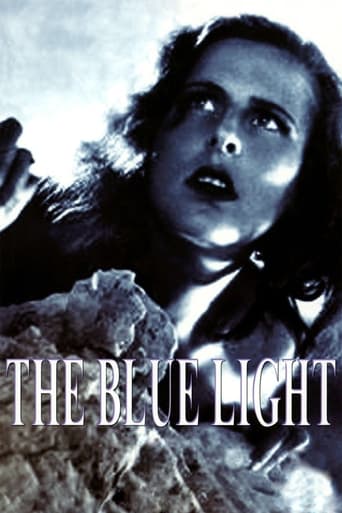Horst in Translation (filmreviews@web.de)
"Das blaue Licht" or "The Blue Light" is a German black-and-white film from over 80 years ago. Writer, director and lead actress is Leni Riefenstahl and this film is one of the main reasons that brought Riefenstahl the adoration of Adolf Hitler, who made her his number-1 propaganda documentary filmmaker for years to come. This one, however, was still made before the Nazi party came into power. Riefenstahl plays a woman, dishonored by society, who lives in the mountains. The men lover her though and several men go to the mountains because of her, where they die from falling in the rocky, rough landscape. However, when the main character, Junta, finally warms up to a man courting her, she is about to face the most severe form of betrayal.The reason is that this is not only a film about love and interhuman relationships, but also about trust and a huge treasure. I must say I liked the ending here. But I am not sure if it is worth waiting for 80 minutes as most of the scenes before aren't really that great or memorable. As solid as Riefenstahl's and Béla Balázs' work behind the camera is, I am not too sure if casting the filmmaker for the main character was a good choice here. She does not have the looks for being considered some sort of femme fatale. Then again, tastes differ, and were probably especially different that long ago. This is a sound film, but there is no color yet and this fact really hurts the film as you could expect with a color being included in the title even. As a whole, I do not recommend the movie. Simply not good enough.
Ben Parker
Leni Riefenstahl's directorial debut (she had been a widely recognised and praised dancer in the 20's and gone on to be one of the most well known silent movie stars, working with Arnold Fanck and G W Pabst on a series of mountain films). Here she shows that magnificent eye exciting visuals probably attainted while shooting up in the mountains with Fanck, and which would go on to make Triumph of the Will the most stunning, famous propaganda film of all time, and Olympia, her film of the 1936 Berlin Olympics the single most famous (and incredible visually) sports documentary of all time.In The Blue Light you will find some of the most stunning visuals in early sound cinema, a gorgeous score and the magnetic, sensual screen presence of Leni herself in the lead role of Junta, the outcast who lives among the crystals in a mountain high above a fairytale village. It is a delight to watch, and one of the great treasures of early sound cinema, in my opinion (though the best things in it have more in common with the dancelike visual grace of the silent screen, than the stagey, wordy early talkies from Hollywood).
tophoca
Unlike the previous reviewer, I have an excellent print of "The Blue Light" that Leni Riefenstahl sent to me a few years ago. This is truly a magnificent film and along with "Tiefland" should be for what this great lady is remembered for. "Triumph of the Will" and "Olympia" are stunning documentaries but "The Blue Light" and "Tiefland" are outstanding movies and a tribute to the greatest female film director ever.
Lars-65
`Das blaue Licht' (The Blue Light) tells the legend of Junta, a strange woman living in the Alpine heights above a Tyrolean village, who has privileged access to a cave of crystals. On full-moon nights a blue light emanates from this secret grotto, luring young men from the valley to seek out the force of the radiant beam. Their quest invariably end in death and causes the towns-people to vilify junta. A painter from Vienna, Vigo, befriends the outcast woman. He becomes her protector and falls in love with her. Following her one blue-lit night, he discovers the way to the cave. He draws a map, thinking that the safe passage to the grotto will serve the best interest of both Junta and the villagers. The towns-people arm themselves with tools and climb to the cave, plundering the valuable crystals and celebrating their new found fortune.Riefenstahl's film -(fantasy) sanctifies nature and reflects a fascination with beauty and harmony. The photography of this picture is visually stunning, and Riefenstahl's masculine beauty and physical abilities make her the perfect choice for the role of Junta. `Das blaue Licht' is one of the last great Weimar films and a must see' not only for movie buffs.


 AD
AD
